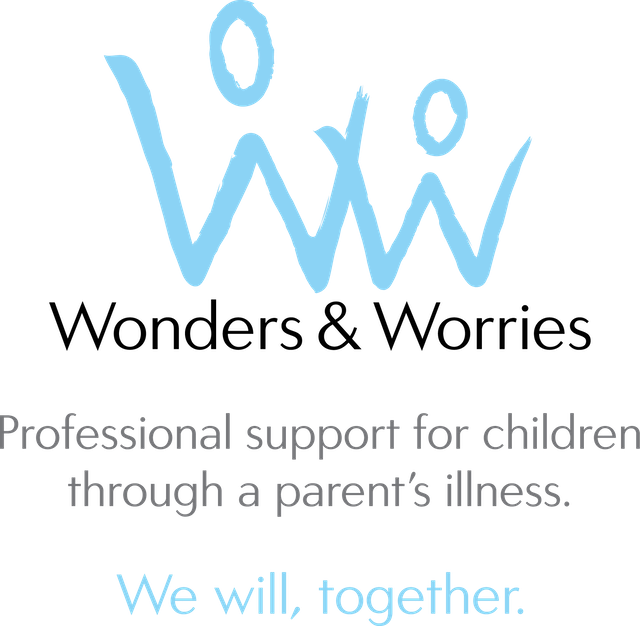
One of the biggest concerns for parents after they have been diagnosed with an illness is how to talk to their children about the medical situation. Additionally, parents wonder how children will understand information that is shared, how they may react to the situation, and information regarding supportive strategies. Below is a chart providing a baseline for how children at different ages think-process-behave when faced with a parental illness. It also provides tips regarding how to best support children at different developmental levels. This is general information and not exhaustive though it will hopefully be a nice initial guide to use when supporting your children. Additional resources that may be helpful include: Talking to Children About Parent’s Illness and other handouts from this section of the app “Child Development and Parenting Strategies.”
Developmental Perspective:
Birth to 2 years (infants and toddlers)
- Concept of Illness: Not concerned with the “what, why and how” of illness
- Potential stress reactions: Changes in routine can cause distress and/or disrupt eating or sleeping patterns. Distress and difficulty soothing may occur due to separation anxiety.
- How to help:
- Provide physical contact and reassuring attention to the child.
- Keep the child’s schedule as consistent as possible.
3 to 5 years (preschool)
- Concept of Illness: May not understand what the illness means but understands changes in the household. They feel this as opposed to understanding what is happening. Due to magical thinking at this age, they may think that they caused the illness by doing something wrong.
- Potential stress reactions: May show some regression and loss of recently gained skills. More frequent “meltdowns” or temper tantrums. Clingy behavior and may have nightmares.
- How to help:
- Name the illness (e.g., Cancer).
- Re-enforce that they did not cause the illness and they cannot catch the illness.
- Provide simple explanations and preparation for new events.
- Create a consistent schedule and maintain when possible.
- Promote play and create a “big energy” part of your house for anger or frustration.
- Think of spaces where your child can be rambunctious and even aggressive without harm to him/herself, or others.
- Talk about feelings and encourage self-expression (art, dance, and music).
6 to 11 years (kindergarten and elementary school)
- Concept of Illness: Can understand more about an illness and how the illness may affect a person’s body.
- Potential stress reactions: Worry and sadness, physical complaints, not as cooperative; may have issues at school and with friends; withdrawal and testing limits
- How to help:
- Maintain honest communication throughout illness and include more details for older school-aged children (pictures can be helpful).
- Answer questions and know that repeated questioning is normal. Provide reassurance about the parent’s health.
- Talk about feelings and encourage self-expression (art, dance, and music).
- Maintain clear rules and boundaries.
- Promote play and create a “big energy” part of your house for anger or frustration.
- Find peer support groups for your child.
12+ years (adolescence)
- Concept of Illness: Understands more details about the body and how an illness may affect the body. Uses discussion as primary form of learning and processing; begins thinking about illness, mortality, and the meaning of life.
- Potential stress reactions: Worry and sadness, physical complaints, not as cooperative; may have big mood shifts and be sleeping more; may have issues at school and with friends; withdrawal and testing limits
- How to help:
- Give complete information about the illness.
- Support peer group connection and having someone to talk to.
- Talk about feelings and encourage self-expression (art, dance, and music).
- Encourage physical outlets.
- Expect that your teen may want to be out with friends even during important times during illness.
- Respect your teen’s behavior (hiding their feelings) if it doesn’t hurt them or others.
- Watch for any red flags (abusing drugs or alcohol) and seek help as appropriate.
- Find peer support groups for your teen.
The above information can give indicators of stress, but the signal that children need more support is when those developmental signs of stress linger for an extended period of time (6-8 weeks) or are intense enough that they are significantly impacting the child.
Examples of significant impact are:
- A child’s primary relationships are affected.
- Things important to a child are changing (they quit their favorite sport, stopped engaging in behaviors that are supportive-exercise, social)
- Their overall mood/demeanor has changed dramatically.
As a parent, you know your children best. If you feel like your child is struggling, they may be, and finding resources to add another layer of support may be helpful. The Wonders & Worries helpline (1-844-WE-WONDER | [email protected]) is available for you to talk with a trained child life specialist who can help provide additional support.

